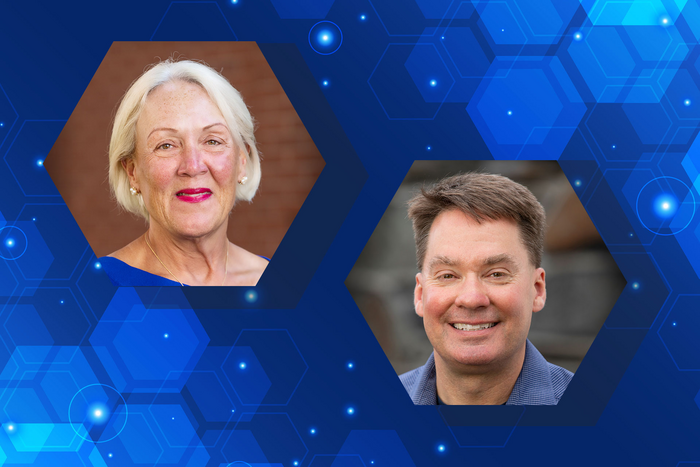Two Tufts faculty members have been named fellows of the American Association for the Advancement of Science, the world’s largest scientific society. They join 504 other scientists, engineers, and innovators from 24 scientific disciplines who are being recognized for their scientific achievements.

Credit: Photos: Anna Miller; Photo collage: Momo Shinzawa, both of Tufts University.
Two Tufts faculty members have been named fellows of the American Association for the Advancement of Science, the world’s largest scientific society. They join 504 other scientists, engineers, and innovators from 24 scientific disciplines who are being recognized for their scientific achievements.
“AAAS is proud to elevate these standout individuals and recognize the many ways in which they’ve advanced scientific excellence, tackled complex societal challenges, and pushed boundaries that will reap benefits for years to come,” says Sudip S. Parikh, AAAS chief executive officer.
Founded in 1848, the AAAS publishes Science, Science Translational Medicine, Science Signaling, and other journals. The nonprofit seeks to “advance science and serve society” through initiatives in science policy, international programs, science education, and more.
This year’s fellows from Tufts are Mitch McVey, professor of biology in the School of Arts and Sciences, and Pamela Yelick, AG89, professor and director of the Division of Craniofacial and Molecular Genetics in the Department of Orthodontics in the School of Dental Medicine. She also serves as director of the Genetics Program in the Tufts Graduate School of Biomedical Sciences. They join 15 other current Tufts faculty as fellows of the AAAS.
“Having our faculty as fellows of the AAAS is powerful sign of the strength and vibrancy of the research program at Tufts,” says Bernard Arulanandam, vice provost for research at Tufts and a 2016 fellow of the AAAS.
Mitch McVey, who has taught at Tufts since 2005, uses Drosophila melanogaster—the common fruit fly—as a model system to study the molecular mechanisms of DNA repair and recombination and how cells tolerate DNA damage.
McVey’s lab is testing a novel model for alternative end joining and identified DNA polymerase theta as a key player in this type of break repair. Cancer cells often become dependent on alternative end joining for their survival, making it a potential therapeutic target.
He also focuses on ways that cells tolerate damage when copying their DNA. His group has shown that fruit flies use translesion synthesis in tissues undergoing rapid cell division, similar to some cancer cells, and is seeking to better understand how damage tolerance is regulated in those tissues.
McVey also takes part in collaborative projects, including one examining how an antidepressant causes oxidative DNA damage that can be ameliorated with vitamin C supplementation, and another using DNA damage as a biomarker of stress in wild birds.
“I am honored to receive this award, which recognizes the collective efforts and dedication of my mentors, collaborators, and scientists in our lab,” says McVey.
Pamela Yelick, a professor in the Department of Orthodontics, also holds adjunct appointments in the cell molecular and developmental biology, genetics, and pharmacology programs at the Tufts Graduate School of Biomedical Sciences and in the Tufts Department of Biomedical Engineering.
Research in her laboratory focuses on mineralized tissue development, homeostasis, disease, and regeneration. Research models include the zebrafish Danio rerio, rodent, rabbit, and mini pig in vivo models, human healthy and diseased tissues, and three dimensional in vitro and in vivo tissue engineering models for human craniomaxillofacial bone, and dental tissue engineering. She is the co-founder and chief scientific officer of RegendoDent, Inc.
Yelick is an internationally recognized leader in dental tissue engineering and craniofacial development, with more than 80 peer-reviewed basic research publications and 200 abstracts since 2000. She has received national and international recognition for her research on dental tissue and whole tooth tissue engineering and has participated in over 200 invited speaker lectureships. She was recently elected as the vice president of the International Association for Dental Research, a four-year term spanning vice president, president-elect, president, and immediate past president.
“It is such an honor to become an AAAS fellow,” says Yelick. “I look forward to continuing to work with the AAAS members and leadership to spread scientific knowledge and understanding for improved health and longevity. It is a particularly exciting time to be conducting research, due to all of the innovative approaches and detailed understanding of molecular genetic mechanisms regulating health and disease. I look forward to my continued participation in AAAS.”




